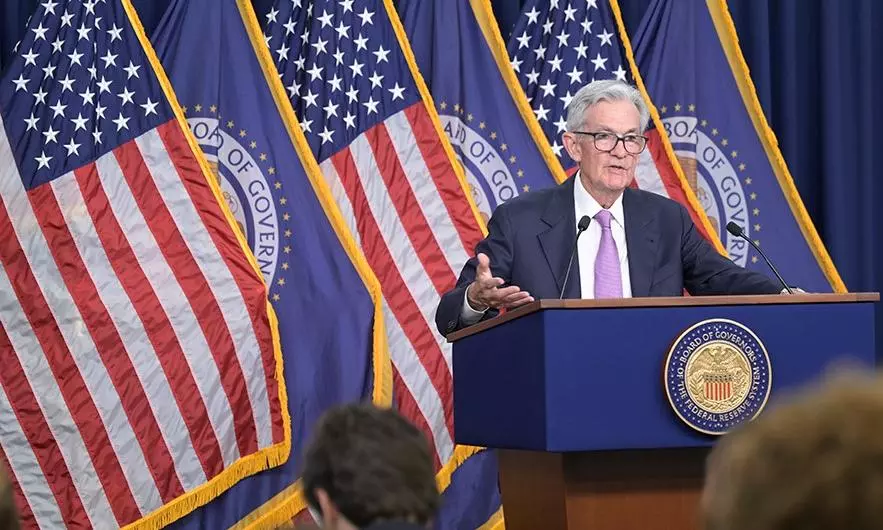
US Federal Reserve Chair Jerome Powell answers reporters' questions at the FOMC press conference on September 18, 2024. Photo: X | @federalreserve
US Fed's 50 basis points rate cut triggers market optimism in India; will RBI follow suit?
Indian stock markets are reacting positively to the US Federal Reserve interest rate cuts; the 'bold' move raises questions of the prospects of a policy shift by RBI

On Wednesday (September 19), the US Federal Reserve reduced interest rates by 50 basis points (0.5 per cent) for the first time in four years, potentially affecting emerging markets such as India.
The Sensex rose about 1 per cent to 83,579 points in the immediate aftermath of the Fed rate decrease, indicating that the stock markets reacted positively to the rate cut.
According to Pawan Bharaddia, co-founder of Equitree Capital, the initiation of rate cut cycle in the US should augur well for Indian markets.
Bharaddia told The Federal, "FIIs have been continuous sellers in the Indian markets during the last three years and now with interest rate cuts beginning, we should see capital being reallocated from bonds to equities. Given its structural growth story India today is shining like an oasis and has been climbing up in most global indices. This should attract FII investments to come back to India and keep markets buoyant.”
What RBI could do
This raises the question of whether the Reserve Bank of India will follow the Federal Reserve's lead, and if precedent is any indication, it will most likely do so. If capital inflows rise and the currency strengthens, the RBI may intervene by decreasing its own interest rates to prevent the rupee from appreciating too much.
The RBI could take this opportunity to stimulate domestic demand by cutting lending rates to encourage growth.
RBI governor Shaktikanta Das has stated that India's financial stability is still a priority and that any rate cut decision will be based on domestic economic factors rather than merely mimicking US policy.
Reacting to the US Federal Reserve move, Trivesh D, COO, Tradejini described it as a "bold move" with a 50 bps rate cut, doubling what was expected.
"While this makes borrowing cheaper and boosts cash flow, it also lowers returns on safer investments like treasury bonds. As a result, investors are looking for better returns in global markets, and India is a prime target for foreign investments," he told The Federal.
Further, Trivesh pointed out, "FIIs, who had pulled out in June and July, are already returning, and with more rate cuts expected, this inflow could continue to grow, making India a top destination for higher returns.”
Outcome of lowered interest rates in US
India may profit from lower interest rates in the United States, which typically lessen the attractiveness of US assets (financial products and investments). This could encourage investors to seek better yields in emerging nations like India. It could result in higher foreign portfolio investments (FPIs) in Indian equities and bonds, boosting stock markets and strengthening the currency.
The global trend of reduced interest rates usually leads to a rise in bond markets. Existing bonds may become more appealing in India due to their higher yields than fresh issuance. This might reduce borrowing rates for the government and enterprises, thus encouraging capital investment and economic growth.
Stronger rupee
Foreign capital inflows may increase demand for the Indian rupee, causing the currency to appreciate. However, a stronger rupee may harm Indian exporters by making their products less competitive in the global market.
A Fed rate cut often weakens the US dollar. This could boost demand for Indian goods by making them more affordable in dollar terms. Increased exports could boost sectors that rely largely on US markets, such as IT services and medicines. Lower borrowing costs in the United States and lower global capital costs may encourage Indian enterprises to borrow for investment.
Indian corporations with borrowings abroad may also see lower interest obligations, boosting profitability and encouraging additional investment. With India being a significant crude oil importer, a Fed rate cut might boost global demand, raise oil prices, increase India's import bill, and cause inflationary pressure. Hence. rising oil costs may offset the benefits of capital inflows and a stronger currency.
While a stronger rupee may alleviate some of the inflationary pressures from imports, rising commodity prices owing to a Fed rate decrease may result in increased domestic inflation.
While a 50-basis-point rate decrease by the Federal Reserve could boost short-term capital inflows and improve market sentiment in India, it raises concerns about inflationary pressures and capital market volatility. In reaction to these external shifts, the Reserve Bank of India must balance regulating inflation and maintaining economic growth.
Next Story

